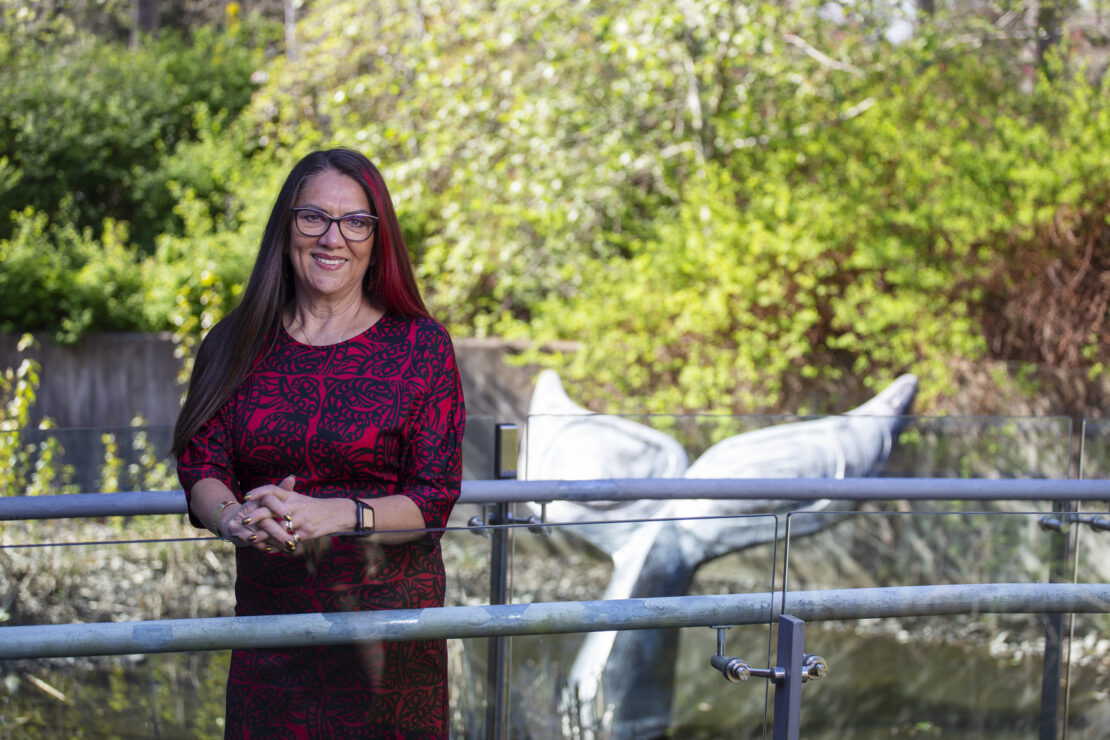Thomas talks about her plan for supporting students, staff, faculty, and Elders

On the Monday following the horrific news from Tk’emlúps te Secwépemc First Nation’s findings at a former residential school, UVic’s Associate Vice-President Indigenous Qwul’sih’yah’maht Robina Thomas was calling emergency meetings, consoling with Elders, and planning support options for the university.
“This weekend has been really hard,” said Thomas when she sat down with the Martlet that day to talk about her new executive leadership role. “I’ve gone from absolute rage, rage, to just being in tears…but I need to do this work with a good mind and a good heart or else I’ll be immobilized.”
As the inaugural AVP Indigenous, Thomas works on UVic’s senior leadership staff and reports to UVic President Kevin Hall. She is two months into the role and has already become an integral part of UVic’s response to the Tk’emlúps te Secwépemc First Nation’s news and has demonstrated the importance of having leadership staff with Indigneous knowledge.
“This isn’t a time for me to be silent, it’s a time for me to actually find a voice and really speak loudly and clearly with that voice,” said Thomas, wearing an orange shirt in solidarity with residential school survivors.
During her 23 years of researching and working at UVic, Thomas has used her voice to speak out about hardships that affect Indigneous communities. Her Master’s thesis work focused on the Kuper Island Residential School where she interviewed and told the stories of three of her own family members who attended residential schools at different times in their life. Through that experience, Thomas became a research expert on residential schools and understands the resonating impact colonial institutions have on families and communities.
“The news that they discovered remains of 215 children is not shocking to me because I’ve heard these stories, they were told to me through my work,” said Thomas with the sorrowful determination of someone grieving truths they have mourned many times before. “People shared stories of residential schools with me because they wanted me to continue to be a voice for the voiceless.”
One of the supports that Thomas helped put together following the news was a solemn sacred fire ceremony that UVic held on June 1, the first day of National Indigenous History Month, to honour and remember the children found by Tk’emlúps te Secwépemc First Nation. Before the moment of silence held at 2:15 pm, Thomas spoke about how vital it was to gather in the ceremony.
In addition to supporting Indigenous students, staff, and faculty, Thomas also expressed that she wanted to provide non-Indigenous people on campus with resources so they can learn about Canada’s true past and present.
“While we support some people in ceremony and in culture and tradition, in another way we’re supporting people by needing to pull together resource lists and provide opportunities [and] say here’s a small list, start here,” said Thomas.
Aside from aiding UVic’s response to the news, Thomas has made other important commitments as the AVP Indigenous. She plans to continue to foster healthy, communicative relationships with the local nations and she sees herself as a bridge between UVic and the local Indigenous communities.
Thomas is a member of Lyackson First Nation with Snuy’ney’muxw and Sto:lo ancestry. She identifies strongly with the Snuy’ney’muxw because they are a matrilineal society, and she holds a deep feeling of responsibility to her grandmother, whose traditional name she carries.
“I’m a Coast Salish woman, I carry a Coast Salish name,” said Thomas. “But I also feel that because I am Coast Salish and I’m surrounded by Coast Salish nations, that I am accountable to the local nations.”
When asked about her style of leadership, Thomas referred back to her PhD work where she developed an Indigenized and decolonial understanding of leadership through interviews held with Indigenous women. She now calls that understanding of leadership “the sacred cycle.”
“One of the teachings from that [research] was keeping the past, the present, and the future connected all the time,” said Thomas. “Our Elders tell us that our teachings are in place to make us the best humans we can possibly be. What better goal than for us to always be striving to be the best humans we can be?”







